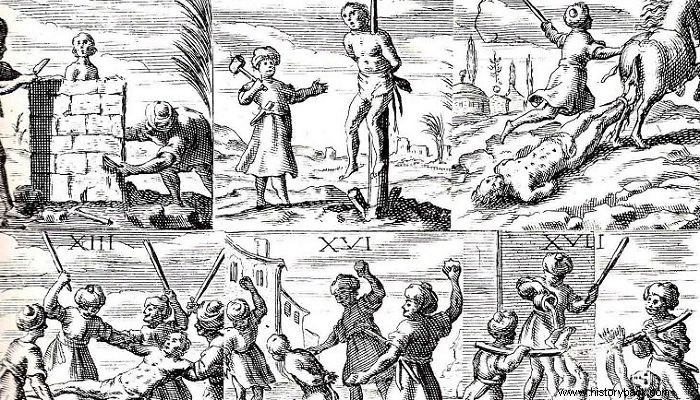
How did the Greeks live during Turkish rule? This question is now answered in Greece in two ways. The first refers to the actual data and the second, the "revisionist", projects the theoretical framework based on "Islamic law".
According to Islam, the world is divided into that of the "believers" and that of the "unbelievers". The duty of the "believers" was to bring the "unbelievers" to the path of Allah. The "Holy War", the jihad, is included in this context. Peace with the "infidels" was forbidden and allowed only for a limited time.
The "people of the Bible" (Jews, Christians) could redeem their lives based on certain conditions. The slaves had to pay the head tax, i.e. the tax to keep their heads on their shoulders, the tribute, i.e. tax on the land and its income, since the land belongs to Allah and the "prophet " and by extension to the "faithful" Turks.
In theory the Turks, as long as the ragiades paid, guaranteed their individual freedom and life. However the whole framework was really entirely theoretical. Ragiades could not even speak well in front of Muslims. Dwelling on the outskirts of the cities, they were obliged to shave the front of their skulls and wear a blue headdress.
They could not ride, nor of course carry weapons. The Turks could "rent" Christian women, legally have children from them, and then expel them.They could also, as they pleased, seize people and goods without giving a reason. Even if the Christian resorted to "Islamic justice", he could not do anything against a "believer".
“Religious freedom” – Islamizations
Also, contrary to what the Muslim law itself imposed, the rajas did not enjoy religious freedom. "Their worship is not allowed, because it is not possible to allow impiety, it is simply not prevented," said an interpreter of the "holy law".
And what religious freedom are we talking about when the vast majority of churches became mosques? When it was forbidden to build new ones, even to repair the old ones? When it was forbidden even to ring the bells?
Or were there no violent conversions to Islam, which were theoretically always prohibited by the "holy law"? Beyond the horror of the Paedomazoma that began in the middle of the 14th century. the suffocating pressures and persecutions against the ragiades resulted in mass conversions to Islam, especially after the Fall, when the Greeks lost all hope.
The Greeks, either by force or through economic pressures, were forced to "turn to Turkey". Many Greeks through slander had to either become Muslims or die. The brave died becoming new martyrs. The many, less brave, succumbed. Many still became Muslims to save their children from child molestation.
In some areas where Muslims were the majority, the Turks even banned Greek. Selim I cut the languages of the Greeks of Egypt after conquering the country.
These happened mainly in the first centuries of the Turkish rule. In any case, however, it would be more appropriate to talk about Turkocracies and not Turkocracy, as many times the livelihood of the Greeks depended on the moods of the local Turkish dynasts.
In this way, Hellenism suffered a dramatic demographic hemorrhage, because those who "turned Turkish" were definitively lost for their homeland and Orthodoxy.
Prophecies
All this gave birth to legends, hopes and expectations. However, as Mattheos Myraion correctly understood as early as 1618 "We hope for the blonde generations to spare us, to come from Moscow and free us, we hope in the oracles, in the false prophecies and we are wasting our time in the myths"...
Before the Conquest there was the legend of the "sad king". According to this legend the Turks would enter the City up to the Column of Constantine. Then an angel of the Lord would give a dagger to the "penita king" who would pursue the Turks to the "red apple tree". The result was of course known.
The legend of the "Marbled King" nurtured generations of Greeks. Later, false prophecies gained ground, which are exploited to this day by television and not only astute ones, such as "Agathangelos".
